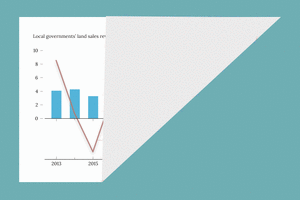Cover Story: China Mulls Tax System Overhaul to Ease Record Local Government Debt
Listen to the full version

China’s Central Economic Work Conference in December proposed the first reforms to the country’s 30-year-old fiscal and taxation system, sparking widespread debate among academics and tax experts. The recommendations – and reactions to them – underscore the urgency for change amid current budget challenges and record local government debt.
The health of the fiscal and taxation system is crucial for economic stability and growth and reforming these systems is essential for sustaining development and enhancing the effectiveness of governance.

Download our app to receive breaking news alerts and read the news on the go.
Get our weekly free Must-Read newsletter.
- DIGEST HUB
- China’s Central Economic Work Conference spurred fiscal and taxation reform debates, targeting the balance of boosting revenue, reducing tax burdens, and giving local governments more autonomy.
- Finance Minister Lan Fo’an outlined a reform agenda focusing on budget system enhancement and fiscal resource optimization amid declining revenue from traditional sources like land sales.
- Local governments considered alternative revenue sources, including state-owned assets and public data, while experts emphasized restructuring expenditure and clarifying fiscal responsibilities to address financial challenges.
The December Central Economic Work Conference in China proposed reforms to the country’s fiscal and taxation system, for the first time in 30 years, highlighting the urgency for change due to current budget challenges and local government debt [para. 1]. Reforming these systems is crucial for economic stability, sustainable development, and effective governance [para. 2]. Policy advisers suggest that changes should balance boosting tax revenue, reducing the tax burden on businesses, and allowing local governments to retain more revenue [para. 3]. Finance Minister Lan Fo’an detailed these reforms with a focus on enhancing the budget system, optimizing fiscal resources, and improving the transfer payment system [para. 4].
China faces post-pandemic economic struggles, with slower revenue growth due to tax cuts and reduced land sale revenues. In 2023, national fiscal revenue was 21.7 trillion yuan ($2.98 trillion), a 2.7% increase from 2019, while land sale income dropped significantly from its peak in 2021 [para. 5][para. 6]. This has put a strain on public services and civil servant salaries in some regions [para. 6].
In recent years, tax and fee reduction efforts included replacing business tax with VAT in 2016 and lowering VAT rates in 2019. Despite tax burdens dropping, many companies still feel pressured due to efficient tax collection technologies and stricter administration amidst economic challenges [para. 7][para. 8]. Yue Shumin, from Renminbi University of China, recommended the tax reform should align the tax burden with economic development [para. 9]. VAT, being the largest tax category, generated 6.93 trillion yuan in 2023, making up 38.3% of total tax revenue, followed by corporate income tax at 4.11 trillion yuan [para. 10]. Adjustments in VAT sharing are anticipated to address revenue distribution issues, especially with the rise of the digital economy [para. 11].
Alternative revenue sources are essential due to declining land sale revenue. Researchers suggest revitalizing state-owned assets, though the sustainability of such measures is questionable. Some steps include the capitalization of public data, but regulations limit data asset scale [para. 13][para. 15]. Increasing the scale of government debt financing also seems necessary; local government debt reached 40.74 trillion yuan at the end of 2023 [para. 17][para. 18].
Reducing expenditure is equally important. There has been a notable shift towards public services and optimizing fiscal spending by clearly defining government roles [para. 20]. Ma Haitao from the Central University of Finance and Economics suggested establishing a dynamic fiscal expenditure list and investing more in key sectors like science, technology, and healthcare [para. 22]. Additionally, measures to control local government expenses have been emphasized and piloted in regions like Shanxi and Qinghai [para. 23].
Adjusting fiscal responsibilities between central and local governments is a crucial part of the reforms. In 2023, local expenditures accounted for 86% of public spending, despite local revenue comprising only 54% [para. 25]. Previous reforms classified many responsibilities jointly, but specifics like teacher salaries should fall under central government roles [para. 27]. The scale of central transfer payments to local governments has increased, surpassing 10 trillion yuan in 2023, but this shift has led to inefficiencies and dependency [para. 29][para. 30].
Experts like Lou Jiwei, a former Minister of Finance, suggest that the central government should assume the costs of its responsibilities, potentially by increasing central staffing and transferring roles from local governments [para. 32].
- 2016:
- China issued guiding opinions to promote the reform of fiscal powers and expenditure responsibilities between central and local governments.
- 2022:
- Qinghai province piloted institutional reform in small counties.
- 2023:
- China’s national fiscal revenue reached 21.7 trillion yuan ($2.98 trillion).
- 2023:
- Local government debt reached 40.74 trillion yuan by the end of the year.
- Late 2023:
- Issuance of 1 trillion yuan of national debt.
- December 2023:
- China’s Central Economic Work Conference proposed the first reforms to the country’s 30-year-old fiscal and taxation system.
- By 2024:
- The reform legislation plan anticipated adjustments to VAT sharing.
- March 2024:
- Finance Minister Lan Fo’an outlined the reform agenda in an article published in Qiushi.
- GALLERY
- PODCAST
- MOST POPULAR







 Sign in with Google
Sign in with Google
 Sign in with Facebook
Sign in with Facebook
 Sign in with 财新
Sign in with 财新